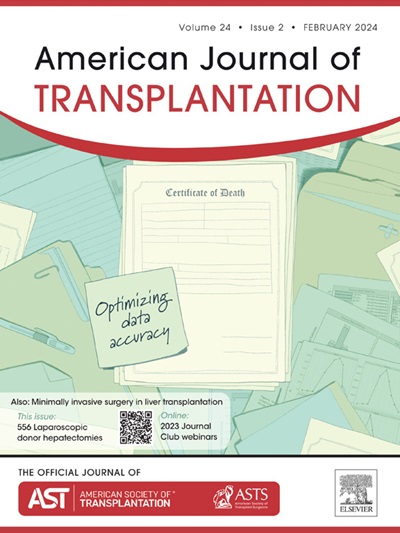重新审视已故器官捐献者转介过程中的种族/民族差异。
IF 8.2
2区 医学
Q1 SURGERY
引用次数: 0
摘要
在死者器官供体转诊过程中的种族/民族差异可能导致器官短缺,并使少数族裔社区处于更大的不利地位。先前的文献引用了大量的不平等,尽管方法上的考虑可能会使估计产生偏差。利用器官检索和收集健康信息用于捐赠数据,我们对6个器官采购组织(opo) 2015-2021年的132968个转诊进行了模拟研究和重新分析。我们从方法模型中排除了脑死亡宣告和死亡的原因/机制/情况,并进行了具有稳健标准误差的泊松回归。我们发现黑人患者的就诊率与白人患者相似,但仍存在差异(发病率比(IRR): 0.910.940.97)。黑人患者的授权率比白人患者低31% (IRR: 0.670.690.71)。在采购时观察到轻微的差异(IRR: 0.940.960.99)。我们的研究结果在方向上与先前的文献相似,但表明不平等程度大大降低(非黑人与黑人转诊的方法和授权风险分别高出23%和65%)。准确量化移植中的种族/民族差异会影响公众对相关人员的看法,特别是opo,这对任何研究都至关重要。重要的是,需要继续采取措施,促进黑人和少数民族患者在我国器官捐赠和移植系统中的平等。本文章由计算机程序翻译,如有差异,请以英文原文为准。
Revisiting racial and ethnic disparities in the deceased organ donor referral process
Racial/ethnic disparities in the deceased organ donor referral process may contribute to the organ shortage and place minority communities at a greater disadvantage. Prior literature cites substantial inequalities, though methodological concerns may bias estimates. Using Organ Retrieval and Collection of Health Information for Donation data, we conducted a simulation study and reanalysis of 132 968 referrals from 2015 to 2021 across 6 organ procurement organizations (OPOs). We excluded brain death declaration and cause/mechanism/circumstances of death from the approach model and conducted Poisson regression with robust standard errors. We found Black patients were approached at a more similar rate relative to White patients, although disparities remained (incidence rate ratio (IRR): 0.910.940.97). Black patients provided authorization at a 31% lower rate than White patients (IRR: 0.670.690.71). Slight disparities were observed at procurement (IRR: 0.940.960.99). Our findings are directionally similar to prior literature but suggest substantially less inequality (vs 23% and 65% higher risk of approach and authorization for non-Black vs Black referrals). Accurate quantification of racial/ethnic disparities in transplantation impacts public perception of those involved, particularly organ procurement organizations, and is paramount to any study. Importantly, continued measures are needed to promote equality among Black and minority patients in our national organ donation and transplant system.
求助全文
通过发布文献求助,成功后即可免费获取论文全文。
去求助
来源期刊
CiteScore
18.70
自引率
4.50%
发文量
346
审稿时长
26 days
期刊介绍:
The American Journal of Transplantation is a leading journal in the field of transplantation. It serves as a forum for debate and reassessment, an agent of change, and a major platform for promoting understanding, improving results, and advancing science. Published monthly, it provides an essential resource for researchers and clinicians worldwide.
The journal publishes original articles, case reports, invited reviews, letters to the editor, critical reviews, news features, consensus documents, and guidelines over 12 issues a year. It covers all major subject areas in transplantation, including thoracic (heart, lung), abdominal (kidney, liver, pancreas, islets), tissue and stem cell transplantation, organ and tissue donation and preservation, tissue injury, repair, inflammation, and aging, histocompatibility, drugs and pharmacology, graft survival, and prevention of graft dysfunction and failure. It also explores ethical and social issues in the field.

 求助内容:
求助内容: 应助结果提醒方式:
应助结果提醒方式:


